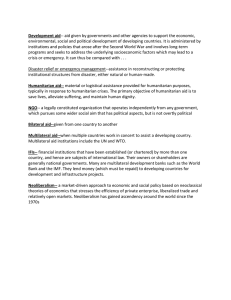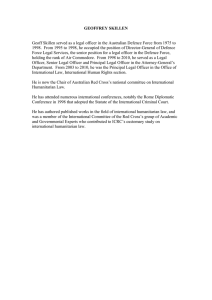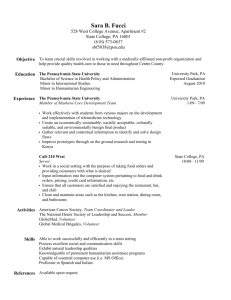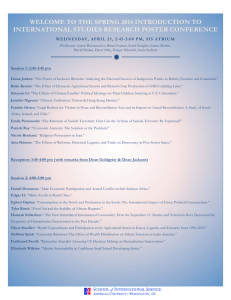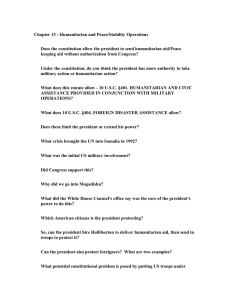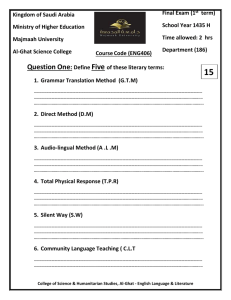GRADUATE COURSE PROPOSAL OR REVISION, Cover Sheet Course Number/Program Name
advertisement
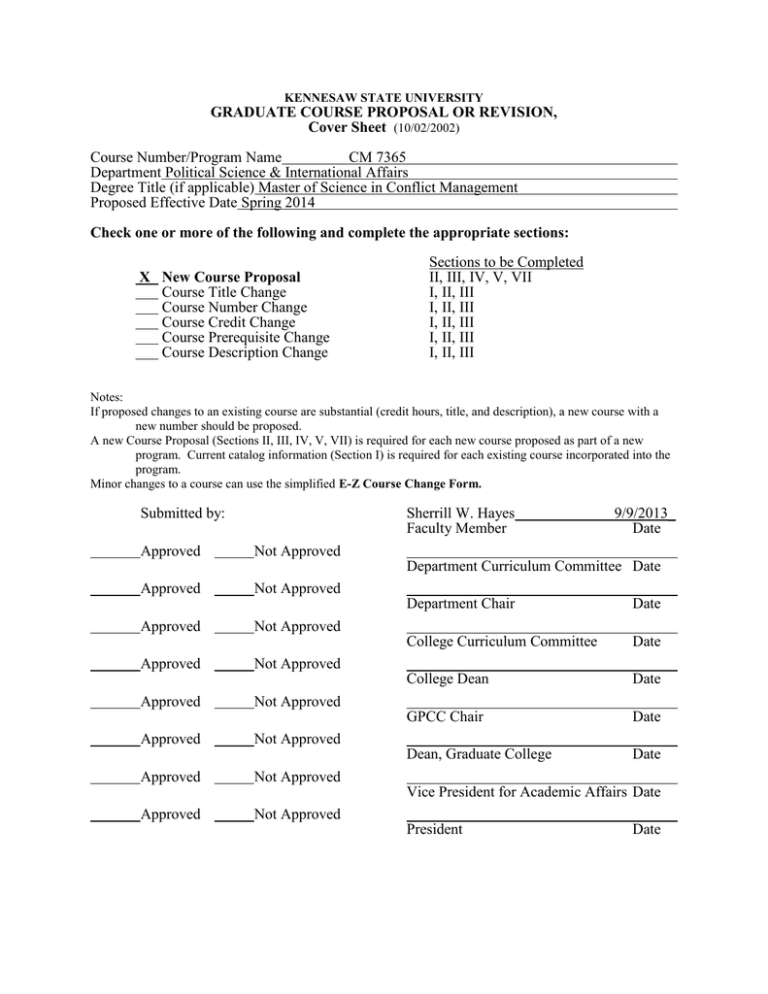
KENNESAW STATE UNIVERSITY GRADUATE COURSE PROPOSAL OR REVISION, Cover Sheet (10/02/2002) Course Number/Program Name CM 7365 Department Political Science & International Affairs Degree Title (if applicable) Master of Science in Conflict Management Proposed Effective Date Spring 2014 Check one or more of the following and complete the appropriate sections: X New Course Proposal Course Title Change Course Number Change Course Credit Change Course Prerequisite Change Course Description Change Sections to be Completed II, III, IV, V, VII I, II, III I, II, III I, II, III I, II, III I, II, III Notes: If proposed changes to an existing course are substantial (credit hours, title, and description), a new course with a new number should be proposed. A new Course Proposal (Sections II, III, IV, V, VII) is required for each new course proposed as part of a new program. Current catalog information (Section I) is required for each existing course incorporated into the program. Minor changes to a course can use the simplified E-Z Course Change Form. Submitted by: Approved Sherrill W. Hayes Faculty Member 9/9/2013_ Date Not Approved Department Curriculum Committee Date Approved Approved Approved Approved Approved Approved Not Approved Department Chair Date College Curriculum Committee Date College Dean Date GPCC Chair Date Dean, Graduate College Date Not Approved Not Approved Not Approved Not Approved Not Approved Vice President for Academic Affairs Date Approved Not Approved President Date KENNESAW STATE UNIVERSITY GRADUATE COURSE/CONCENTRATION/PROGRAM CHANGE I. Current Information (Fill in for changes) Page Number in Current Catalog ___ Course Prefix and Number ___ Course Title ___ Class Hours ____Laboratory Hours_______Credit Hours________ Prerequisites ___ Description (or Current Degree Requirements) II. Proposed Information (Fill in for changes and new courses) Course Prefix and Number ____CM 7365_______________________________ Course Title _____Humanitarian Crisis Intervention ___________ Class Hours 1 ___Laboratory Hours___0____CreditHours___1_____ Prerequisites None Description (or Proposed Degree Requirements) This is a two-day training course designed to explore a range of dilemmas and scenarios in humanitarian, peacebuilding, conflict and human rights crises. The course is built around using simulations. III. Justification The content of this course was previously offered as one-weekend of CM 7305, a two-credit clinic course. We are replacing the one 2-credit course with a series of three one-credit courses, which should allow for more student choice in the curriculum, student transcripts to better reflect the content covered in the curriculum, and the potential for offering embedded certificates in the program focused in particular areas of conflict management (international, workplace/organizational, and courts/justice). IV. Additional Information (for New Courses only) Instructor: Dr. Sherrill Hayes Texts: Information about Atlantica http://www.humanitariantraining.org/Humanitarian_Training/Atlantica.html Humanitarian Negotiation: A handbook for securing access, assistance and protection for civilians in armed conflict 15 October 2004 by Deborah Mancini-Roth & André Picot http://www.hdcentre.org/uploads/tx_news/188HumanitarianNegotiation.pdf Code of Conduct for the International Red Cross and Red Crescent Movement and NGOs in Disaster Relief: http://www.ifrc.org/en/publications-andreports/code-of-conduct/ ICRC visits to people deprived of their freedom http://www.icrc.org/eng/resources/documents/misc/detention-visits-010407.htm International Review of the Red Cross: “Discussion: What are the future challenges for humanitarian action?” – July 19, 2012. http://www.icrc.org/eng/resources/documents/article/review-2011/irrc-884interview.htm Exploring Humanitarian Law (EHL) at www.redcross.org/ehl Prerequisites: None Objectives: At the end of this course, students will be able to: Describe and analyze national, international and historical perspectives on conflict intervention practice in the context of humanitarian principles and practice; Apply the main analytical frameworks for addressing the protection of life, livelihoods, and the rights and safety of people caught in complex and violent emergencies; Apply and demonstrate crisis negotiation principles. Apply interview skills for visiting detainees and others deprived of their freedom Instructional Method The course is based around the “Atlantic Hope” simulation exercise, that is a series of exercises that build on range of skills in humanitarian negotiation, interviewing, and cross cultural communication. Method of Evaluation This is a pass/fail course. As there is no written work associated with this skills clinic. to pass the course students must attend the simulation and be fully engaged in the role plays, group debriefs, and other activities for the length of the simulation. To receive credit students must be on-time all activities and engage in active listening and discussion of the presented material. V. Resources and Funding Required (New Courses only) Resource Amount Faculty Other Personnel Equipment Supplies Travel New Books New Journals Other (Specify) 0 0 0 0 0 0 0 0 TOTAL 0 Funding Required Beyond Normal Departmental Growth $0 VI. COURSE MASTER FORM This form will be completed by the requesting department and will be sent to the Office of the Registrar once the course has been approved by the Office of the President. The form is required for all new courses. DISCIPLINE COURSE NUMBER COURSE TITLE FOR LABEL (Note: Limit 30 spaces) CLASS-LAB-CREDIT HOURS Approval, Effective Term Grades Allowed (Regular or S/U) If course used to satisfy CPC, what areas? Learning Support Programs courses which are required as prerequisites Conflict Management CM 7325 Humanitarian and Crisis Int 1-0-1 Spring 2014 S/U APPROVED: ________________________________________________ Vice President for Academic Affairs or Designee __ VII Attach Syllabus CM 7365 Humanitarian Crisis Intervention 1 credit Professor: Sherrill W. Hayes Class hours: Friday 3:00pm-8:00pm/ Saturday 8:30am-4:30pm Office Hours: By appointment Email: shayes32@kennesaw.edu Phone: (770) 423-6499 CATALOG DESCRIPTION: This is a two-day training course designed to explore a range of dilemmas and scenarios in humanitarian, peacebuilding, conflict and human rights crises. The course is built around using simulations. COURSE LEARNING OBJECTIVES: At the end of this course, students will be able to: Describe and analyze national, international and historical perspectives on conflict intervention practice in the context of humanitarian principles and practice; Apply the main analytical frameworks for addressing the protection of life, livelihoods, and the rights and safety of people caught in complex and violent emergencies; Apply and demonstrate crisis negotiation principles. Apply interview skills for visiting detainees and others deprived of their freedom TEACHING STRATEGIES: CM 7365 uses the “Atlantic Hope" simulation, which is a continuous two day-long field training exercise that simulates a complex humanitarian emergency for university graduate students in conflict studies. Exercise participants work in a fictional country, dubbed “Atlantica”, that has suffered a large internal uprising, ethnic and regional conflict and post conflict hostilities and violence. The exercises are structured around a series of scripted major and minor events that present a variety of real humanitarian and peace-building dilemmas. Situational details are provided in a comprehensive political, social, economic, and geographic guide for the participants. The guide also provides reference information on the positions of several different Atlantican factions, U.S. government agencies present in Atlantica, international organizations, community members, military units, local intermediaries, and other fictional NGOs. Over three days in the field, participants have to problem-solve in the field and work around the clock to help alleviate a humanitarian crisis and lay the foundations for a lasting peace in the war-torn country. Grading: This is a pass/fail course. As there is no written work associated with this skills clinic. to pass the course students must attend the simulation and be fully engaged in the role plays, group debriefs, and other activities for the length of the simulation. To receive credit students must be on-time all activities and engage in active listening and discussion of the presented material. To determine final grades, students will be evaluated on the following: Simulation Participation [100%] Simulation participation grading rubric: Atlantic Hope Student______________________________ Date_____________________ Rating: (5) Exceptional (4) Average (3) Below Expectations ____ Consistent and engaged participation in all team experiences ____ Supportive and collaborative interaction in team growth and development ____ Actively sharing ideas, feelings, personal experiences and observations during down time and group and team debriefings ____ Listening, relating and synthesizing the ideas of others in group discussion ____ Providing constructive feedback on the learning process to faculty mentors and team members ____ Contributing constructive advice and feedback during exercises and in follow-up debriefings ____ Reading all required field materials and interactive materials to be fully prepared for each exercise ____ Total/35 Avg.= Grade = Each student will keep a notes of the intervention exercises and scenarios, strategic planning sessions, roles they played in each scenario and interpersonal communication and performance issues within the team and larger cohort. These notes will not be evaluated for a grade, but will provide notes and insights on the student’s own experience. ************************************************************************ REQUIRED READING Information about Atlantica http://www.humanitariantraining.org/Humanitarian_Training/Atlantica.html Humanitarian Negotiation: A handbook for securing access, assistance and protection for civilians in armed conflict 15 October 2004 by Deborah Mancini-Roth & André Picot http://www.hdcentre.org/uploads/tx_news/188HumanitarianNegotiation.pdf Code of Conduct for the International Red Cross and Red Crescent Movement and NGOs in Disaster Relief: http://www.ifrc.org/en/publications-and-reports/code-of-conduct/ ICRC visits to people deprived of their freedom http://www.icrc.org/eng/resources/documents/misc/detention-visits-010407.htm International Review of the Red Cross: “Discussion: What are the future challenges for humanitarian action?” – July 19, 2012. http://www.icrc.org/eng/resources/documents/article/review-2011/irrc-884-interview.htm Exploring Humanitarian Law (EHL) at www.redcross.org/ehl ************************************************************************ Academic Integrity Statement: Every KSU student is responsible for upholding the provisions of the Student Code of Conduct, as published in the Undergraduate and Graduate Catalogs. Section II of the Student Code of Conduct addresses the University's policy on academic honesty, including provisions regarding plagiarism and cheating, unauthorized access to University materials, misrepresentation/falsification of University records or academic work, malicious removal, retention, or destruction of library materials, malicious/intentional misuse of computer facilities and/or services, and misuse of student identification cards. Incidents of alleged academic misconduct will be handled through the established procedures of the University Judiciary Program, which includes either an "informal" resolution by a faculty member, resulting in a grade adjustment, or a formal hearing procedure, which may subject a student to the Code of Conduct's minimum one semester suspension requirement. Please note: Turning in the work of others as your own, turning in papers downloaded from the Internet as your own, using more than three substantive words in order from an uncited source, and/or using ideas or concepts borrowed from others without adequate citation will be considered plagiarism. We reserve the right to review any student papers and assignments through plagiarism-review services or software. disAbled Student Support Services: DSSS is a part of the Student Development Center (SDC). Kennesaw State University does not discriminate on the basis of disability in admission or access to, or treatment or employment in, its programs or activities. KSU promotes equity in academic access through the implementation of reasonable accommodations (for more information, visit http://www.kennesaw.edu/stu_dev/dsss/ or Student Center, Suite 267). Students who require reasonable accommodations because of a physical, mental, or learning disability should notify the instructor of this course as soon as possible and preferably before the end of the first two weeks of class to arrange for reasonable accommodations. Should you require assistance or have further questions about the ADA, please contact Carol Pope, the ADA Compliance Officer for Students, at 770-423-6443.
